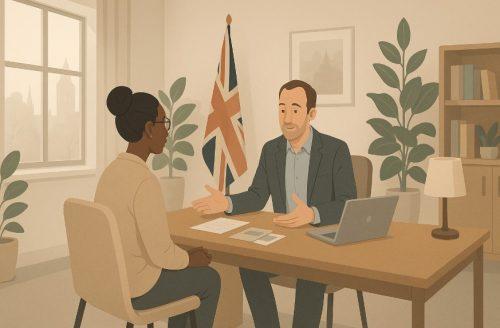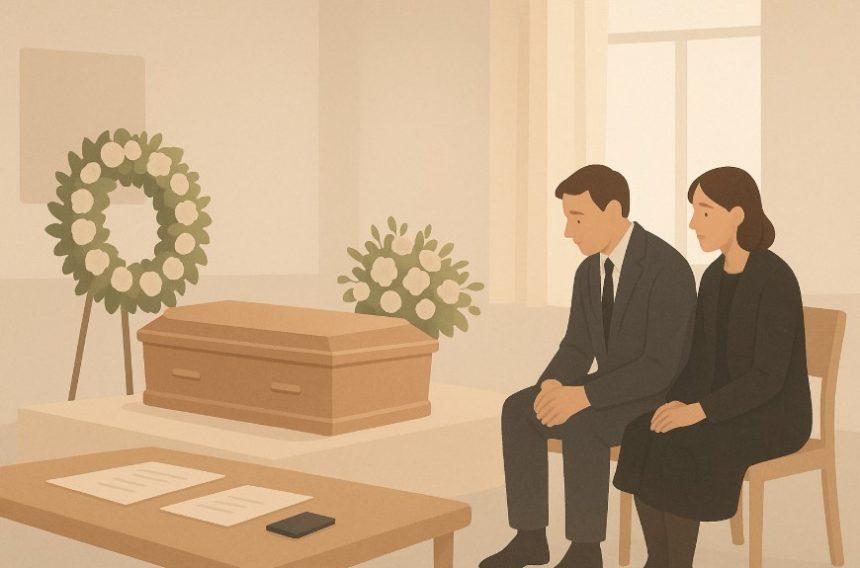Planning a funeral can be overwhelming, especially when you’re facing financial difficulties. You may wonder, how much is a funeral grant from DWP in 2025 and how it can help you cover essential costs. Many people in the UK are unaware that the Department for Work and Pensions (DWP) offers support to those arranging a funeral for a loved one, particularly when on certain benefits.
This financial assistance, called the Funeral Expenses Payment, helps cover specific funeral-related costs. It’s important to understand how it works, who qualifies, and what you can expect to receive.
In this guide, you’ll find all the answers you need about eligibility, amounts, application steps, and additional support options. Whether you’re arranging a funeral or just preparing for the future, having this knowledge can make a difficult time a little less stressful.
What Is a DWP Funeral Grant?

A DWP Funeral Grant, officially called a Funeral Expenses Payment, is financial help provided to individuals who receive certain benefits and are responsible for arranging a funeral. This payment is designed to help cover the necessary costs associated with burying or cremating a loved one. Importantly, it does not usually cover the full cost of a funeral but offers valuable support to reduce the financial burden.
The grant can help with essential expenses such as burial or cremation fees, the cost of moving the body if it needs to be transported more than 50 miles, travel expenses related to arranging or attending the funeral, and necessary documents like death certificates.
In addition, you can receive up to £1,000 for other funeral expenses, which may include the funeral director’s fees, flowers, or the coffin. However, if the deceased had a prepaid funeral plan, only up to £120 can be claimed for items not covered by that plan. The payment can either be made directly to you if you’ve already paid the funeral costs or to the funeral organiser if you haven’t.
Who Is Eligible for a Funeral Grant in the UK?
Eligibility for a Funeral Expenses Payment depends on several factors, including your relationship with the deceased and whether you receive qualifying benefits. To qualify, you must be on one or more of these benefits Universal Credit, Income Support, income-based Jobseeker’s Allowance, income-related Employment and Support Allowance, Pension Credit, Housing Benefit, or Support for Mortgage Interest loan.
Additionally, your relationship with the deceased is crucial. You can apply if you are:
- The partner of the deceased
- The parent of a baby stillborn after 24 weeks of pregnancy
- The parent or responsible person for a child under 16 (or under 20 if in approved education or training)
If no one else close to the deceased can claim, such as when they have no partner or their relatives live abroad or are in prison, a close friend or relative may apply. Keep in mind, if another close relative is working or not on qualifying benefits, you might not be eligible. Checking your specific circumstances with an advisor is always recommended.
How Much Does DWP Pay Towards a Funeral in 2025?

If you’re arranging a funeral in 2025 and qualify for support, you might wonder exactly how much help you’ll get from the DWP. The Funeral Expenses Payment covers specific essential costs, but it’s important to understand that it typically won’t cover the entire funeral bill.
You can claim for burial or cremation fees, doctor’s certificates, and moving the body if it’s over 50 miles, plus travel costs to attend or arrange the funeral.
Additionally, you may receive up to £1,000 for other necessary expenses like funeral director fees, flowers, or a coffin. However, if a prepaid funeral plan exists, only up to £120 can be claimed for items not included in that plan.
Here’s a simple breakdown:
| Expense Type | Maximum Amount |
| Burial or cremation fees | Full cost (if necessary) |
| Transport of body (50+ miles) | Full cost |
| Travel to funeral/arrangements | Full cost |
| Documents (e.g., certificates) | Full cost |
| Other funeral expenses | Up to £1,000 |
| Prepaid plan extra costs | Up to £120 |
Remember, if funds are available from the deceased’s estate or insurance, the payment will be reduced accordingly.
How Do You Apply for a Funeral Expenses Payment?
If you’re eligible, applying for the Funeral Expenses Payment is a straightforward but careful process.
Application Process Explained
To apply, you must submit a claim within six months of the funeral date, even if you’re still waiting for your benefit application outcome. You can make the claim before the funeral as long as you have an invoice or signed contract, but estimates are not accepted.
Documents You Need to Provide
You’ll need:
- Proof of your qualifying benefits
- Funeral director invoice or contract
- Death certificate or relevant documentation
- Bank or payment details
These documents ensure your claim is processed without delays.
How Long It Takes to Receive Payment?

Typically, decisions are made after your next Universal Credit payment if applicable, and payment can take up to four weeks. If you’ve already paid for the funeral, the funds go to your account. If not, the money is paid directly to the funeral organiser.
For help, contact the Bereavement Service helpline:
- Telephone: 0800 151 2012
- Welsh language: 0800 731 0453
- Textphone: 0800 731 0464
- Timing: Monday to Friday, 8am to 6pm
What Happens if the Funeral Grant Doesn’t Cover All Costs?
While the Funeral Expenses Payment is a valuable help, it often doesn’t cover everything, leaving some families with additional costs. If you find yourself in this situation, you have several options to consider.
You might apply for a Budgeting Loan if you’re on specific benefits, which offers an interest-free way to cover extra costs. Some families negotiate with the funeral director to reduce services or select simpler options to lower expenses. Local councils or charities may also offer additional support, particularly for families on low incomes.
Key points to remember:
- Budgeting Loans help with extra funeral costs
- Funeral directors may offer lower-cost packages
- Local council or charitable grants can provide additional help
Always explore these avenues early to avoid unexpected financial pressure during a difficult time.
Can You Get a Funeral Grant if You’re Not on Benefits?

If you’re struggling with funeral costs but don’t receive qualifying benefits, you may still have options. While you won’t be eligible for the DWP’s Funeral Expenses Payment, other forms of assistance might be available.
Some local councils offer public health funerals for those without family or funds. Additionally, charities and non-profit organisations sometimes provide support or small grants to help cover funeral expenses. Prepaid funeral plans can also ease the burden, as they lock in services ahead of time, reducing the need for last-minute funding.
Consider:
- Asking local councils about public health funerals
- Contacting charities offering financial assistance
- Planning ahead with prepaid funeral plans
It’s essential to seek advice early and explore all available resources when facing funeral costs without government benefit support.
What Are Common Misunderstandings About Funeral Grants?
Many people hold misconceptions about the Funeral Expenses Payment, which can lead to confusion and frustration. One common myth is that it covers all funeral expenses, but in reality, it only helps with specific necessary costs.
Another misunderstanding is about who can apply; some think any family member or friend can claim, but strict rules around benefits and relationship apply.
Other misunderstandings include:
- Thinking the payment is a guaranteed right, when it’s conditional on eligibility
- Expecting the payment immediately, when it can take weeks to process
- Assuming the grant covers luxury options, when it only covers basic, necessary expenses
Understanding these points can save you stress and disappointment, so it’s wise to research thoroughly or consult an advisor before making plans.
Conclusion
When you’re facing the loss of a loved one, financial worries can make a hard time even harder. Knowing how much is a funeral grant from DWP in 2025 and how to access it can ease some of that burden.
While the Funeral Expenses Payment won’t cover everything, it offers meaningful help with the most important costs. By understanding the eligibility rules, application steps, and what to expect, you can better prepare and avoid surprises.
Remember, even if you’re not eligible, other options like local council support, charitable help, or prepaid funeral plans may be available. Planning ahead and knowing your rights can make a difficult process more manageable for you and your family.
FAQs
How long does it take to get the DWP funeral grant?
It usually takes up to four weeks after you apply to receive a decision and payment.
Can you apply for a funeral grant before the funeral?
Yes, you can apply before the funeral if you have a signed invoice or contract, but not with an estimate.
Does the funeral grant cover flowers and coffin?
Yes, up to £1,000 can be used for other funeral expenses, including flowers and a coffin.
What happens if the deceased has an estate?
The DWP may recover part or all of the payment from the deceased’s estate if sufficient funds are available.
Can friends apply for a funeral grant?
Friends can apply only if no family member or partner is available or eligible to make the claim.
Is the funeral grant available in Scotland?
No, in Scotland, you must apply for the Funeral Support Payment, which replaces the Funeral Expenses Payment.
What if I disagree with a funeral grant decision?
You can appeal the decision through the Social Security and Child Support Tribunal if you believe it was incorrect.








